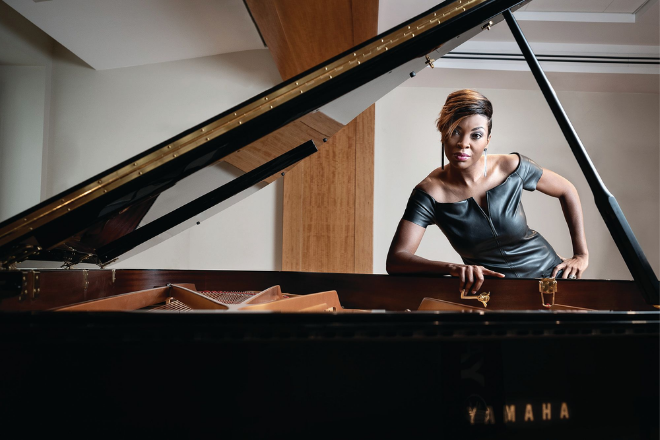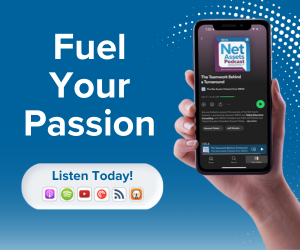Interview by Jeff Shields, FASAE, CAE, President and CEO of NBOA
Jade Simmons is a classically trained pianist and frequently called classical music’s “No.1 Maverick.” Avoiding the traditional recital, she takes her audiences on concert adventures that span everything from Rachmaninoff to rap. Simmons has performed at the White House and Supreme Court, and was one of the rare classical artists invited to perform at the South by Southwest Festival, where her show was branded one of the “Best of SXSW.” She is also a published author and the acclaimed host for American Public Media’s hit podcast, “Decomposed.” Simmons will share insights on cultivating innovation and originality, audacious leadership and strategies that unleash momentum in life and business.
Jade Simmons Annual Meeting Preview by NBOA
Jeff Shields: We’re excited to have you speak at our conference and help independent school business and operations professionals break out of their routines and think differently. Your work as a classical pianist has something in common with many independent schools — an emphasis on tradition. How have you balanced your strengthens in classical music with the desire to push the envelope and cover new ground?
Jade Simmons: I have come to this place, of pushing the boundaries of classical music, almost by accident. Early in my career, I was trying very hard to impress my audience and replicate tradition, and I found myself growing very anxious. I would come on stage and do whatever I thought Mozart wanted me to do, which I never will be able to do. I started to ask myself, “Why am I performing?” Was it just to impress people with all the hours of practice I put in?
I realized that what I really desired was to take an audience on a journey of sorts. We know there’s music involved, but we don’t have a set destination for where it will take us. By refiguring my mission from “piano recital” to “concert adventures,” I let go of the pressure to, say, play Mozart perfectly or miss no notes on the Chopin. Instead, I wanted to get the audience to experience what a piece sounds like in the second movement of the Mozart. I wondered, “How can I begin to evolve the tradition without dishonoring it?”
When I began talking to my audience in between movements, that created a new tradition right on the spot. I was having more fun on stage — I was enjoying what I was doing and was actually more connected to the music. I wasn’t trying to break tradition but instead explore tradition openly on stage, as if to say, “What about this?” Now I can say with confidence, “Mozart, I honor you, I love what you created. I’m going to take it from here.” I imagine that for independent schools, the same applies: To get to a new place, you start by honoring tradition and then you shape it in new ways.
Shields: You’re right that schools are very much in that place of revisiting their missions and their values to make the right choices, particularly in light of acknowledging and rectifying past harms. Revisiting traditions in the current environment can be challenging. How can we break through the tension that many school stakeholders are experiencing to create communities that are diverse, equitable and inclusive?
It’s true that these conversations may not always be comfortable or easy. We are having to face some things that we probably should have faced a long time ago.
Simmons: I think that if organizations can start these conversations from a place that we all believe in together — our mission statements and core beliefs — we can move forward in a way that’s driven by curiosity and exploration. If we want to educate young people to be the best adults they can be, perhaps we can all agree that part of that is recognizing humanity in everyone, even those who are different from us. Nobody’s going to say, “No, we don’t agree with that.” So we start with that core belief and ask, “How are we living this out? How are we honoring the people in this room?” That’s the only way we’re going to get to a place of a living mission statement, rather than a shiny plaque that we’ve had on our wall for a long time.
It’s true that these conversations may not always be comfortable or easy. We are having to face some things that we probably should have faced a long time ago. As the daughter of a civil rights activist, I was raised by a father who is the type to fight all the battles. And in his work, he has to see a lot of negative in order to go after a problem and flush it out. But unlike my father, I prefer to pick certain battles and see the positive. My default is to assume that even if someone’s beliefs seem different or, in worst cases, warped, that there is good in there. There are a lot of reasons for us to be hopeful.
Shields: So how do we help our independent school finance and operations professionals find the strength to rethink traditions and take a step outside the familiar?
Simmons: So much of change is often forced upon us. When I first started speaking to audiences, it was because I was tired and out of breath. It was out of necessity. That’s what schools experienced in 2020. My kids, who both attend private school, suddenly found themselves doing online schooling, using Zoom for the first time. There was a steep learning curve for everyone — the students, the parents and of course the faculty and staff at their school. Because change was forced upon us, we are now able to use the tools we took from the past two pandemic-affected school years and use them powerfully.
The reason why change is often difficult is because there’s a whole part that we skip between idea and implementation. I see it in churches a lot, where, for example, the board decided on a change and set a date for it, but the parishioners don’t get a warning. If the parishioners heard the leaders preaching or teaching the change, they’d have a better relationship with it.
We know we can innovate under pressure, but what about in other circumstances? What if we choose one thing to evolve this year or this semester?
We can also change by choice, to continue tradition in an evolved fashion that serves us better. For instance, when I’m performing in front of an audience, I get to choose what elements of the music I evolve. It could be the rhythm or the baseline, for example, but still the audience will hear the core of the piece. I think that’s why music is so powerful, because it teaches us to recycle and reinvent tradition.
We know we can innovate under pressure, but what about in other circumstances? What if we choose one thing to evolve this year or this semester?
Shields: Business officers are often faced with many choices and ultimately must determine which initiatives and proposals will best use school resources to make the greatest impact aligned with mission. You are not only a performer, but a keynote speaker, podcast host and author among other roles. What advice would you give others who are trying to sort through opportunities in their organizations?
Part of being able to preserve your energy, time and resources is admitting that you may not be able to get to everything on your list. Instead, focus your energy on accomplishing three or four things that really serve the school’s mission — otherwise, the change won’t adhere to your community. I
Simmons: I’m sure you’re familiar with the concept of the tyranny of choice: that our greatest problem in the future will be the fact that we have too many options and it will cease our productivity and efficiency. One of the reasons that the pandemic hit our society so hard is that it forced us to slow down and think about the way we make decisions. Every time we set a return date for the office and had to push it back, we got disappointed at an elevated level. We were reminded that we can get lost in an abundance of choices and arbitrary dates and find ourselves burnt out.
I’ll give you an example. For the first year and a half of the pandemic, my husband and I stayed home to help our kids with online learning, and we ended up homeschooling my youngest daughter. This past fall, we were all ready to roll back to pre-pandemic routines, so we sent the kids back to school three days a week. The week after school started, my husband and son tested positive for COVID. It was like, “Wow, that lasted three days, and now we have to pivot to something else.”
Part of being able to preserve your energy, time and resources is admitting that you may not be able to get to everything on your list. Instead, focus your energy on accomplishing three or four things that really serve the school’s mission — otherwise, the change won’t adhere to your community. It’s easier to be flexible and make pivots when we haven’t overloaded our hearts and hands with these premature ideas of what things have to be.
If you prioritize your mission and the actual people at the heart of your community, I think everyone will experience a universal drop in blood pressure and better enjoy this period of immense change. And hopefully we’ll be able to put aside time to really understand who we’ve become over these last two years and the things we’ve accomplished. With gratitude and perspective comes the opportunity to get excited about what’s ahead.
Shields: Thank you very much for your time, and we look forward to seeing you speak in February at our conference.





